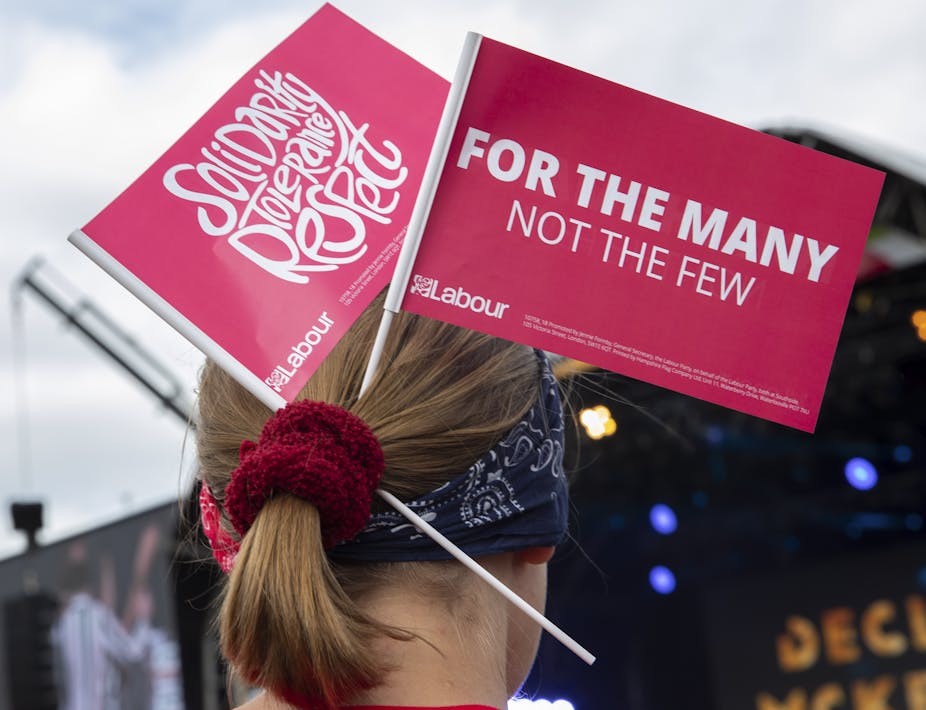Jeremy Corbyn has promised Labour MPs that their party will remain a “broad church”. This year’s Labour Party conference will no doubt test that commitment.
“The Labour Party,” MP Gerald Kaufman wrote in 1966, “would not be what it is – maddening, perhaps, but also capable of arousing strong positive emotions – if people not only with widely differing views but also with widely differing analyses of episodes in the Party’s history did not come together as fellow members.” This is a good description of the broad church. Labour finds strength through its difference, channelling the best of what can sometimes appear to be troubling antagonisms. But how applicable is this to the Labour Party right now?
Jon Lansman, the founder of Momentum and a member of Labour’s governing body, the National Executive Committee (NEC), tweeted recently that “Tony Blair was never in the right party and there will never be a return to his politics” within Labour.
Lansman’s latter suggestion is, perhaps, a defensible medium-term prediction. But suggesting that Blair was “never” in the right party? The early Blair, even as leader, was very comfortable inside the Labour Party. The Labour members who elected him recognised that Blair represented a challenge to some of the party’s traditions, but also saw a leader arguing for a socialism (he and Gordon Brown were not reluctant, in the early days of New Labour, to use the word) with recognisable themes, rooted in the party’s history, and more politically nuanced than the connotations of the label “Blairite” suggest today.
The later Blair moved some distance away from his party. He disengaged with its traditions – a damaging legacy for his successors that aided Corbyn’s rise. But to ignore the different versions of Blair’s “politics” – and to further an analysis of Labour as a homogeneous entity temporarily taken over by a “Tory”, is to question Labour’s broad church.
Tony Benn, for whom Lansman once worked, eloquently expressed the “different Blairs” in his diaries. In 1994, watching Blair make a speech, he wrote: “It was really quite radical … I think he’s frightened the life out of the Liberals … It was a good and radical speech and I have no complaint about it at all.” Watching Blair depart 12 years later, he saw a leader who “hectored us and bullied us … making us feel totally inadequate”. Both parts of this analysis can be true.
Practical and ideological
In a recent pamphlet Centre Ground, the Labour MP Chris Leslie contrasted an “evidence-based” approach to politics with an “ideologically driven approach”. Competing traditions within Labour have conflicting views on the role of ideology. From its foundation, the party’s ideology has been unclear and figures from both left and right have argued for a more precise vision. Many have blamed the sometimes rudderless nature of Labour’s politics on its misguided pragmatism. Others have sought to protect its “practical” outlook, thinking values like fairness were sufficient to guide it.
The broad church has, in the past, made room for both. To be too readily dismissive of ideology is to ignore rich Labour traditions, including from the centre and right of the party. As Andrew Thorpe wrote in his history of the party, Labour’s early years brought together not only those focused on “controlling markets and other apparently mundane issues”, but also those who seemed to embody a more radical set of beliefs.

What Michael Foot called “imaginative sympathy” within the Labour Party – recognising the legitimacy of Labour’s competing traditions, whatever your own view – appears to be running rather low in some sections of the movement. Dissent, including from former Labour leaders and prime ministers, can be reasonably met with rebuttal – but seeking to ostracise falls short of a commitment to Labour’s broad church. So too does the view that to hold ideological belief, with great fervour, is somehow out of place within the Labour Party.
Such discord is not without precedent, of course. Holding the broad church together has been challenging for past Labour leaders, including for Foot. Yet with a conference agenda focusing in large part on internal party democracy (the longstanding “who decides” question in Labour’s politics) and including constituency party motions on “open selections” and a referendum on the government’s Brexit deal, this conference could be one of the more memorable stress tests of Labour’s broad church.
It’s also an opportunity for Corbyn to set out how he sees Labour’s broad church – and to work out how to channel it into positivity.

